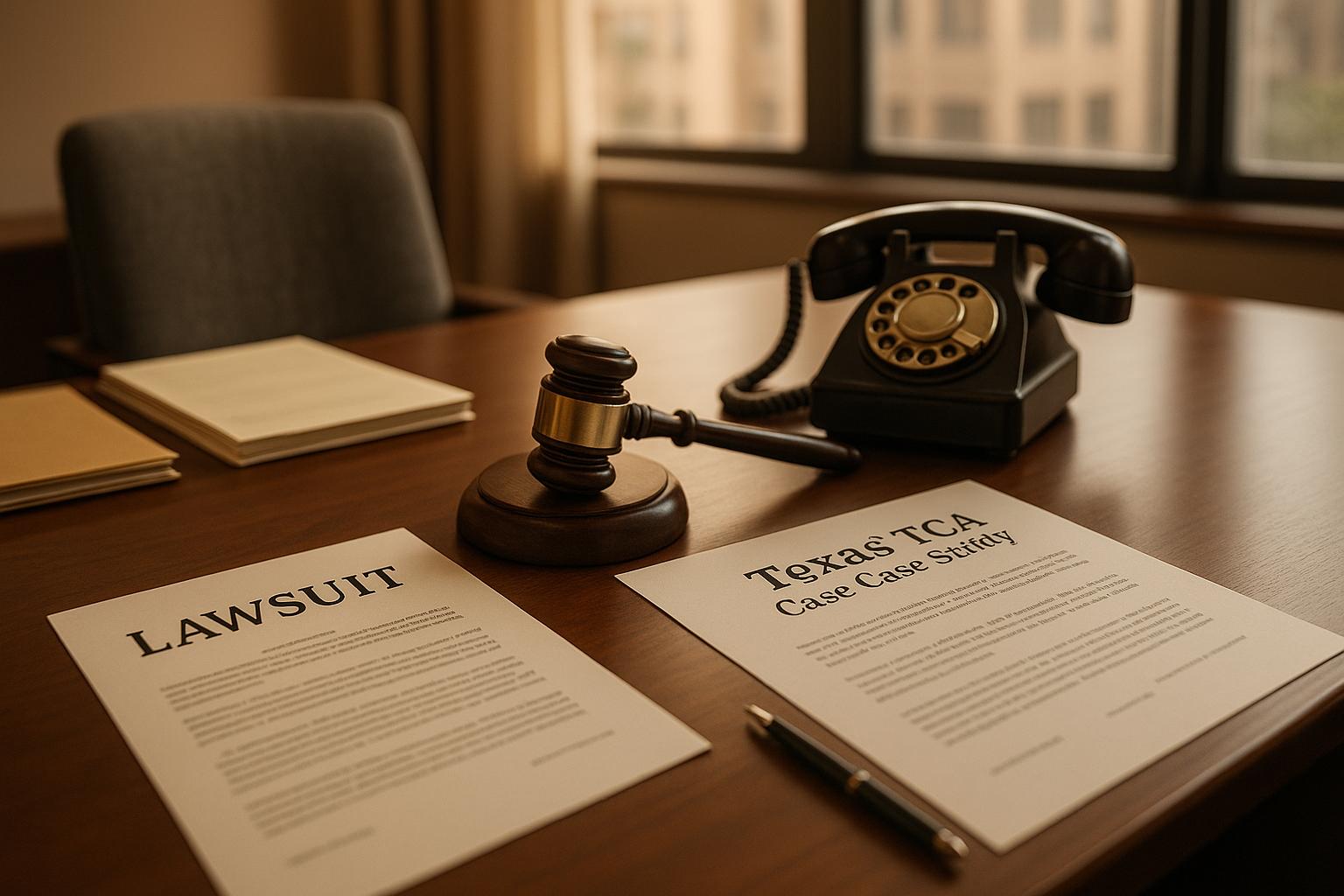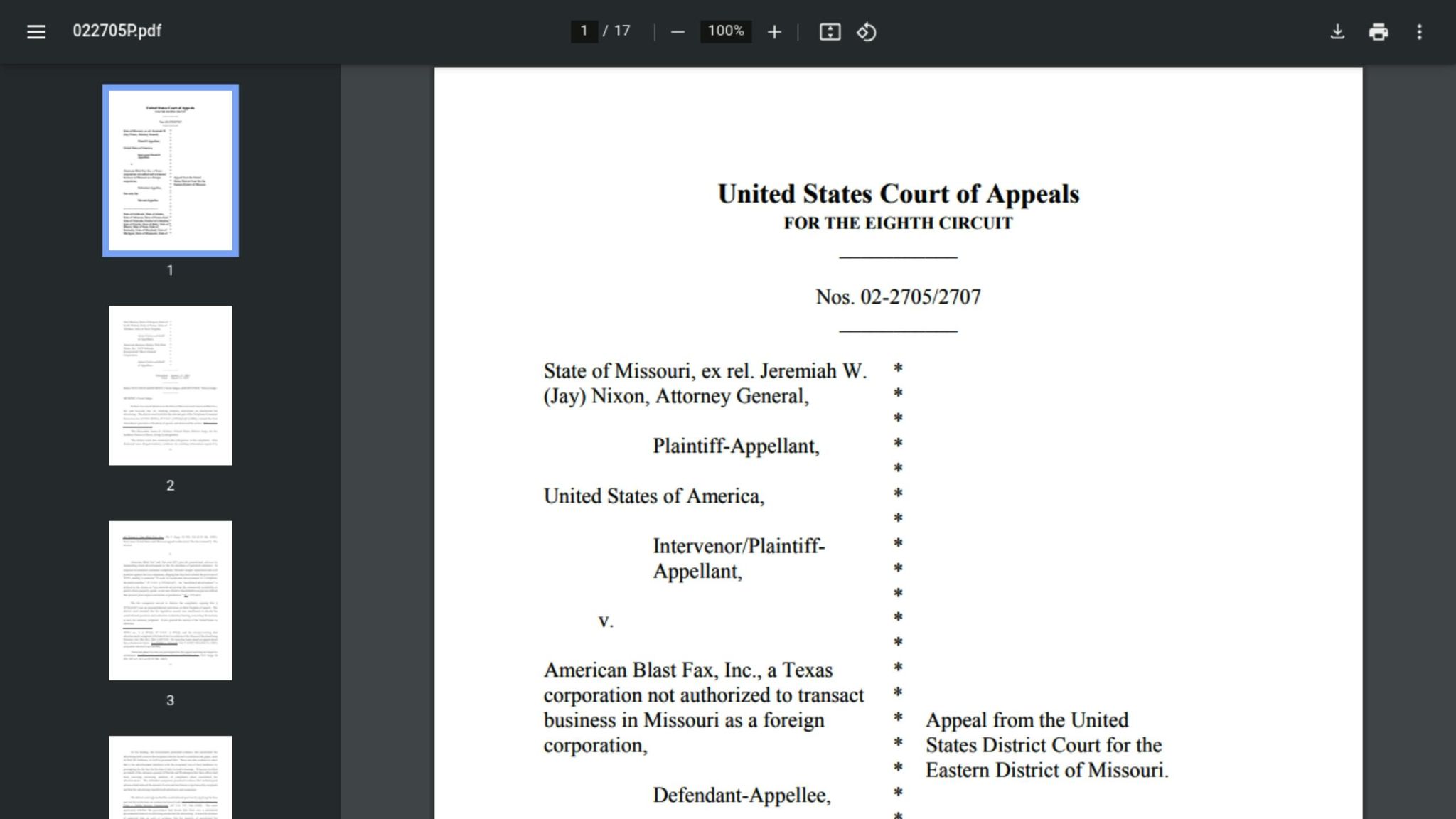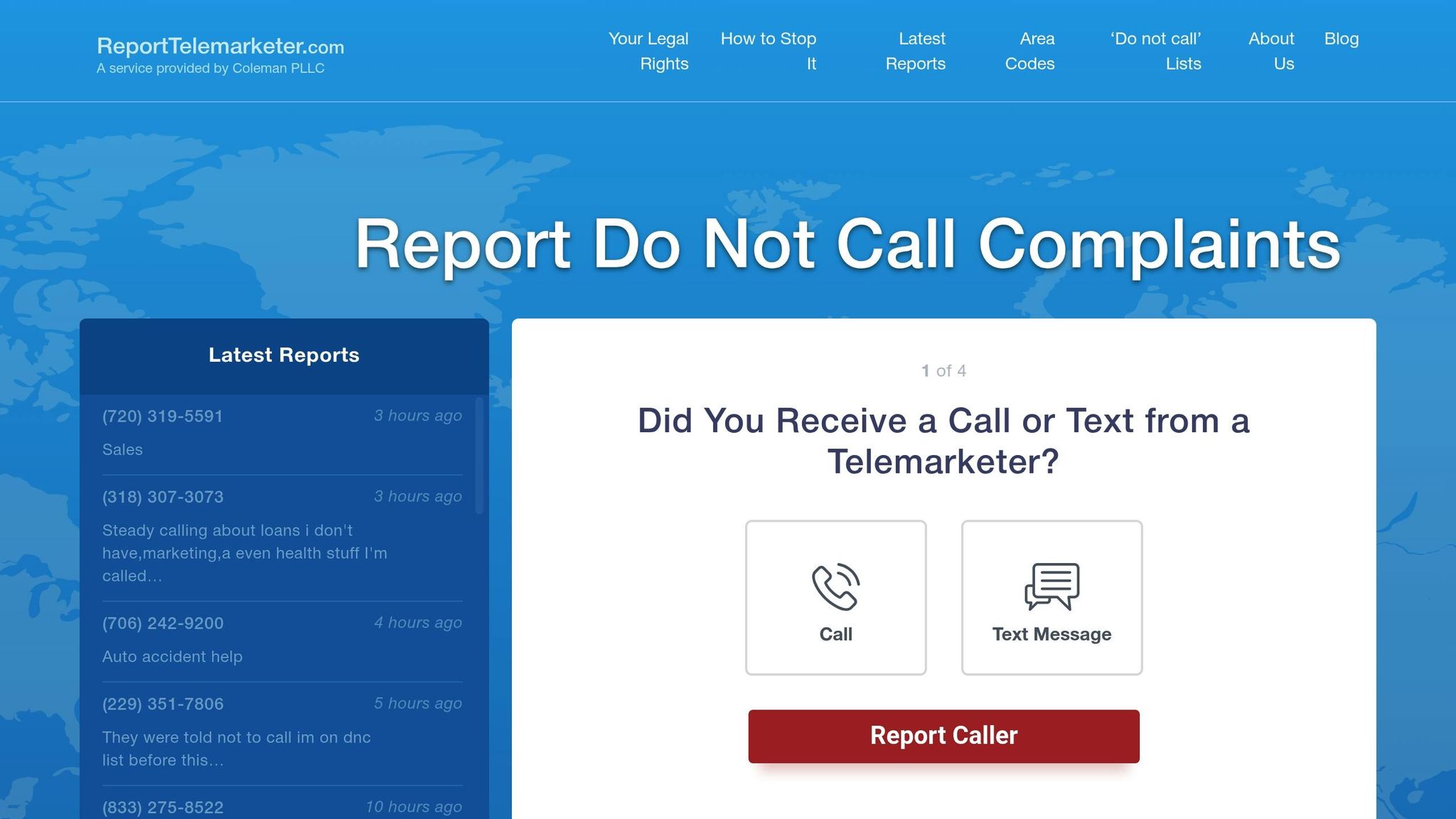
The case of Texas v. American Blastfax is a landmark in enforcing telemarketing laws under the Telephone Consumer Protection Act (TCPA). It highlighted how corporate officers can be personally held accountable for illegal practices, such as sending unsolicited faxes. American Blastfax, Inc., run by Greg and Michael Horne, was found guilty of violating the TCPA and the Texas Deceptive Trade Practices Act (DTPA) by distributing millions of fax advertisements without recipient consent. Despite court orders, they persisted in their actions, even misrepresenting the law to customers. The court imposed a $485,375 penalty and issued a permanent injunction, setting a strong precedent for holding businesses and their leaders accountable for telemarketing violations. This case reinforced consumer protections and clarified that intrastate telemarketing activities also fall under federal law.
Background of the American Blastfax Lawsuit

Company Profile and Business Practices
American Blast Fax, Inc. was a fax-advertising company that focused on sending client advertisements to fax machines, primarily targeting individuals and businesses in Texas. The company was owned and operated by brothers Greg and Michael Horne, who shared equal ownership, with Greg serving as president and Michael as vice president. Since 1997, the Hornes personally managed all aspects of the company’s operations.
The firm maintained an extensive database of roughly 500,000 fax numbers. These numbers were sourced from various places, including phone books, computer programs, public records, and purchased lists. To illustrate the scale of their operations, a single advertiser using their services could send up to 60,000 fax advertisements weekly.
However, the company’s practices raised serious concerns. During a deposition, Greg Horne admitted that more than half of the recipients in their database – approximately 250,000 individuals – had neither given explicit permission nor had any prior relationship with the company. This lack of consent became a central issue, drawing the attention of Texas regulators.
Texas State Legal Action
The State of Texas took legal action against American Blastfax after warning the company that each unsolicited intrastate fax advertisement violated the Telephone Consumer Protection Act (TCPA). Despite these warnings, the company continued its operations, prompting the State to escalate to formal litigation.
The lawsuit, filed against American Blastfax, Inc. and its officers Greg and Michael Horne, alleged violations of both the TCPA and the Texas Deceptive Trade Practices Act (DTPA). Beyond the unauthorized fax transmissions, the State also accused the company of misleading customers about the legality of its business practices.
American Blastfax’s defiance was blatant. Even after the court denied their motion to dismiss in October 2000 and reaffirmed in February 2001 that the TCPA applied to intrastate faxes, the company continued sending unsolicited advertisements. Shockingly, some of these faxes were sent to the Texas Attorney General’s office itself. Meanwhile, the company misled potential customers about the law. In one instance, a Blastfax salesperson falsely claimed in October 2000 that the TCPA only applied to interstate faxes. A month later, the company’s legal counsel sent a letter to a recipient of unsolicited faxes, asserting that intrastate fax transmissions were not prohibited by federal or Texas law.
During a deposition, Greg Horne was asked why the company hadn’t adjusted its practices after the court’s October 5, 2000 order. His response was telling:
"Judge Sparks’ [October 5, 2000] order held that the TCPA applies to intrastate practices. In light of that holding, why have you not changed your practices regarding what’s disclosed? A: We just feel like that we didn’t want to change it."
This defiance became a cornerstone of the State’s case. Texas argued that American Blastfax’s misleading statements and failure to disclose accurate legal information led both potential customers and fax recipients to believe that the company’s unsolicited intrastate fax advertisements were lawful.
10 Most Expensive TCPA Lawsuit Settlements and How to Avoid Them with Compliance Tools
TCPA Violations and Legal Arguments
This section dives into the specific violations of the TCPA and deceptive practices that escalated the legal case against American Blastfax.
Unsolicited Fax Advertisements and TCPA Violations
The State of Texas presented clear evidence showing that American Blastfax violated the TCPA by sending unsolicited fax advertisements within the state without obtaining consent from recipients. These violations persisted even after the company was formally notified in February 2000 that its actions were illegal.
Testimony revealed that more than half of the contacts in Blastfax’s database lacked either prior express consent or an established business relationship. Despite being warned and receiving a court order on October 5, 2000, American Blastfax continued its unlawful activities. Notably, the company even sent unsolicited faxes to the Texas Attorney General’s office. The violations were backed by court exhibits, which included specific document numbers such as ABF 1046-71, 1646-57, 831-51, 1661-66, 124-49, 1673-80, 1211-13, 1633-45, and 1727-32.
Deceptive Practices and DTPA Violations
Texas also accused American Blastfax of deceptive practices under the Texas Deceptive Trade Practices Act (DTPA). The company systematically misled consumers about the legality of its faxing operations. According to Greg Horne’s testimony, when potential customers inquired about whether these faxes were legal, Blastfax’s policy was to provide only one Texas statute while avoiding any mention of the TCPA or the court’s October 5, 2000 order. This tactic falsely legitimized their actions in the eyes of customers.
Adding to the deception, the company’s legal counsel sent a letter on November 19, 2000, to a fax recipient claiming that intrastate unsolicited fax transmissions "are not prohibited by either federal or Texas state law", despite the court’s ruling to the contrary. Similarly, on December 14, 2000, the company faxed a message to the Dallas Mavericks asserting that the TCPA did not apply to the advertisements it sent on the team’s behalf, while conveniently omitting any reference to the court order. These deliberate misrepresentations played a key role in the court’s decision to hold corporate officers personally liable.
Personal Liability of Corporate Officers
Texas argued that Greg and Michael Horne, as corporate officers, should be personally accountable for the violations due to their direct involvement. The court sided with this argument, identifying the Horne brothers as the "guiding spirits" and "central figures" behind the TCPA violations. They were held jointly and severally liable with American Blastfax, Inc. for all TCPA damages.
The court relied on the precedent set in General Motors Acceptance Corp. v. Bates, which states: "When corporate officers directly participate in or authorize the commission of a wrongful act, even if the act is done on behalf of the corporation, they may be personally liable". This case reinforced the principle that corporate officers can’t hide behind the corporate veil when they are directly involved in unlawful actions.
sbb-itb-a8d93e1
Court Judgment and Impact
Following the proven violations of the TCPA, the court issued a significant ruling that underscored both the enforcement of the law and the accountability of corporations engaged in telemarketing practices.
Final Judgment and Penalties
The court delivered a strong verdict against American Blastfax, Inc. and its principals, the Horne brothers, holding them jointly and severally liable for violating the Telephone Consumer Protection Act (TCPA) and the Texas Deceptive Trade Practices Act (DTPA). The judgment was based on the company’s extensive fax advertising campaign, which involved approximately 2.5 million monthly fax advertisements. Evidence showed that 75% of these faxes were received, and at least half of the recipients had not provided consent.
Initially, the court considered imposing the statutory maximum penalty of $500 per violation. However, it determined that such an amount would be unfair and instead reduced the damages to seven cents per violation for most of the period. For the final month of the campaign – February 9, 2001, through March 15, 2001 – the court tripled the damages, citing the defendants’ willful and knowing continuation of their illegal practices after being informed of their TCPA violations.
| Penalty Category | Amount |
|---|---|
| TCPA Damages | $459,375 |
| DTPA Damages | $6,000 |
| Attorneys’ Fees | $20,000 |
| Total Judgment | $485,375 |
In addition to the financial penalties, the court issued a permanent injunction against the defendants. This injunction barred them from sending unsolicited fax advertisements, misrepresenting their compliance with the TCPA, or engaging in activities designed to circumvent the court’s orders. The ruling not only imposed financial consequences but also set a precedent for stricter enforcement of telemarketing laws.
Impact on Telemarketers and Consumers
The American Blastfax ruling sent ripples through the telemarketing industry and reinforced consumer protections. It established several key legal precedents that continue to influence TCPA enforcement.
One of the most important aspects of the decision was the court’s determination that corporate officers could be held personally liable for TCPA violations. This meant that individuals directly involved in illegal activities could not escape accountability by hiding behind their corporate entity. As a result, the Horne brothers were unable to dissolve their company and restart their operations under a new name.
The court also clarified that the TCPA applies to intrastate fax advertisements, emphasizing that telemarketers must obtain proper consent even for campaigns conducted within a single state. This interpretation significantly expanded the scope of the TCPA and ensured that consumers were protected regardless of geographic boundaries.
The case also highlighted the effectiveness of state-level enforcement. The Texas Attorney General’s successful prosecution demonstrated that state authorities could take meaningful action against TCPA violations, encouraging other states to pursue similar cases.
By combining substantial monetary penalties, personal liability for corporate officers, and a permanent injunction, the ruling created a strong deterrent for future violators. The court emphasized that the TCPA’s damages provision was designed not only to compensate individual victims of unsolicited fax advertisements but also to prevent broader public harm.
For consumers, this case validated their frustrations with unwanted fax advertisements and reinforced the idea that businesses must comply with consumer protection laws once notified of their illegal practices.
The American Blastfax decision remains a pivotal case in TCPA litigation, shaping how courts address corporate officer liability and the calculation of damages in large-scale telemarketing campaigns. It continues to serve as a warning to companies that disregard consumer rights.
Consumer Protection and Reporting Telemarketing Violations
The American Blastfax case highlights the importance of consumers taking an active role in reporting telemarketing violations. Individuals are essential in identifying and addressing TCPA violations that disrupt their daily lives. Below, we’ll explore how ReportTelemarketer.com supports consumers and the steps you can take if you encounter TCPA violations.
How ReportTelemarketer.com Supports Consumers

ReportTelemarketer.com offers a straightforward way for consumers to address unwanted telemarketing calls and texts. With over 30,000 people helped so far, the platform empowers individuals to take action against telemarketers who break the law.
Here’s how it works: When you report a telemarketer using the site’s form, the platform investigates the number using specialized tools to determine if the telemarketer lacked proper consent to contact you. If a violation is found, they file a cease-and-desist letter or complaint on your behalf. They also provide resources to help you understand your rights under telemarketing laws.
One of the best parts? It’s completely free for consumers. ReportTelemarketer.com covers attorney fees by claiming them directly from the telemarketer, ensuring you don’t have to pay out of pocket.
Steps to Take Against TCPA Violations
While ReportTelemarketer.com offers expert assistance, consumers also play a critical role in stopping illegal telemarketing practices by documenting and reporting violations.
Here are some common signs of TCPA violations:
- Unsolicited robocalls or unauthorized texts
- Calls to numbers on the National Do Not Call Registry
- Prerecorded messages made without consent
- Calls that fail to provide proper identification
To take action, start by keeping detailed records. Document the date, time, and details of each call, text, or voicemail. Save caller ID information, screenshots of text messages, and voicemails. If possible, ask for the caller’s name, company, and contact information.
Another important step is to ensure your phone number is listed on the National Do Not Call Registry. If you continue to receive calls after registering, it strengthens your case for a TCPA violation.
You can also file a complaint with federal agencies like the Federal Communications Commission (FCC) or the Federal Trade Commission (FTC). These agencies investigate and take enforcement action against repeat offenders.
If violations persist, consulting a TCPA attorney may be beneficial. The TCPA allows for legal action within a four-year statute of limitations. Consumers may seek statutory damages, join class action lawsuits, or request injunctive relief when violations are proven.
Conclusion
The Texas v. American Blastfax case reshaped the understanding of TCPA enforcement, particularly emphasizing that even intrastate fax advertisements require express consent. It confirmed that businesses cannot bypass federal rules by limiting their operations to a single state. This ruling underscored the necessity of obtaining clear consent before sending fax advertisements, setting a stricter standard for compliance.
A key takeaway from the case is the personal accountability of corporate officers. The court made it clear that executives who knowingly authorize or participate in TCPA violations cannot shield themselves behind the corporate structure. This decision serves as a strong reminder that leadership carries responsibility, especially when it comes to adhering to telemarketing laws.
Although the company faced potential punitive damages, the court awarded $459,375 in damages and an additional $20,000 in attorney fees. This outcome demonstrated a balanced approach, ensuring due process even in cases involving deliberate violations. Moreover, the ruling highlighted that misleading claims about TCPA compliance could lead to further penalties under state consumer protection laws.
The case also reinforced the rights of consumers, showing that legal frameworks are in place to protect against unlawful telemarketing practices. Services like ReportTelemarketer.com continue to empower individuals by providing a platform to report unwanted calls and texts, helping to hold businesses accountable for non-compliance.
Ongoing enforcement efforts, combined with active consumer participation, remain essential in the fight against illegal telemarketing activities.
FAQs
Can corporate officers be held personally liable for telemarketing violations under the TCPA, as seen in the American Blastfax case?
Yes, the American Blastfax case confirmed that corporate officers can be held personally responsible under the Telephone Consumer Protection Act (TCPA). This applies particularly when they are directly involved in the violations or when their actions indicate that corporate protections shouldn’t shield them from accountability.
This case underscores that courts can bypass corporate status to hold individuals accountable for unlawful telemarketing practices. It’s a clear warning for corporate officers to prioritize compliance with telemarketing laws to avoid facing personal liability.
What does the American Blastfax case mean for telemarketers sending faxes within Texas?
The American Blastfax case underscores that intrastate fax campaigns fall entirely under the jurisdiction of the Telephone Consumer Protection Act (TCPA). In simpler terms, telemarketers can be held legally accountable for sending unsolicited faxes even within the boundaries of a single state, such as Texas.
This decision broadens the potential liability for telemarketers, emphasizing the importance of adhering to both federal and state laws. For businesses using fax marketing, securing proper consent from recipients is non-negotiable – failure to do so could result in steep fines and other serious penalties.
How can I report and take action against illegal telemarketing calls or texts under the TCPA?
If you’re dealing with unwanted telemarketing calls or texts that go against the Telephone Consumer Protection Act (TCPA), there are steps you can take to address the issue.
Start by filing a complaint with either the Federal Communications Commission (FCC) or the Federal Trade Commission (FTC). Both agencies have systems in place to handle such violations. Another proactive step is registering your phone number with the National Do Not Call Registry, which can help cut down on unwanted calls.
By reporting these violations, you’re helping authorities investigate and take action against illegal telemarketing activities. In some situations, you might even be able to seek damages for TCPA violations. These actions not only safeguard your rights but also contribute to curbing further breaches.